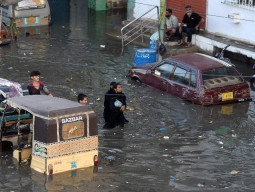
Considered an authority on Pashto literature, poet, fiction writer and critic Hamish Gul Khalil is well-known among his peers and his readers. However, little is known about his knack for compiling literary masterpieces which have otherwise been lost in the sands of time.
Over the years, Khalil has collected and published the works of many writers and poets to ensure modern audiences get the opportunity to learn about their past. His repertoire includes original manuscripts of works that were published centuries ago and probably lost in storage.
“I believe the works of classical Pashto writers serve as a bridge which can take Pashto literature forward,” the 85-year-old writer and poet tells The Express Tribune. According to him, it was important to draw attention to these rare texts and literary works so the younger generation does not forget the past.
The written word
Born on April 19, 1930 in Tehkal area of the provincial capital, Khalil has worked hard to attain the stature among literati that he enjoys today.
For the promotion of Pashto, Khalil initially dabbled in politics – by being associated with the National Awami Party – and then journalism. He launched the Pashto daily Bagram. However, he remained unsuccessful in both fields and eventually dedicated his life to literary pursuits. His love for Pashto knows no bounds as is evident by his continuing efforts for the language despite his age and frail health.
However, his services for Pashto literature and Pukhtun arts and culture have never been recognised by the government. He has not received any national awards for his contribution to preserve the strength of the written word. Now in his 80s, he is suffering from various health problems, and has not received any financial assistance to help him shell out for hospital bills.
“It is my love for Pashto that keeps me going,” says Khalil. “I realised a long time ago that those who forget their own language gradually lose sight of their own existence.”
A lost world
Khalil has compiled the works of countless Pashto poets and writers of yore. He has spent a considerable amount of time at museums and libraries in pursuit of lost literary material.
He is single-handedly responsible for compiling Diwan-e-Mirza Khan Ansari; Diwan-e-Abdul Malik Fida; Diwan-e-Abdul Qadir Khan Khattak; Diwan-e-Ashraf Khan Hijri (in Persian), among several others.
He has also compiled the works of famous Pashto poet Khushal Khan Khattak. Khalil found original manuscripts of the poet’s works, Ikhlaq Nama and Firaq Nama, at Peshawar Museum and decided to compile and publish them. The 84-year-old has also complied Baaz Nama, which was previously considered to be the work of Khushal Khan. However, Khalil discovered that it was written by Afzal Khan Khattak, the warrior poet’s grandson.
He has also compiled Qissa-e-Shah o Gada written by Abdul Hamid Baba and made it more readable for the modern reader. A book on Pukhtun games, explaining where in the province and how they are played, and in what seasons is also among his compilations.
“It is a difficult and arduous task to search for manuscripts and requires one to be meticulous,” he says. “Sometimes, I have to travel throughout the province to search for manuscripts. There have been times when I have found just a few pages of a manuscript.”
A prolific writer, Khalil has also published a compilation of the details of 3,000 Pashto writers and poets from the classical era till modern poets. The book, which is his most famous one to date is, titled Da Qalam Khawandan has attracted considerable praise. Pakhtun Lekwal, another book by Khalil on Pashto writers is also available at local bookstores. Furthermore, he has translated French literature into Pashto.
Undeterred by the challenges, Khalil has continued to work to preserve Pashto literature.
In a league of his own
“Khalil’s status is not less than an institution,” says eminent litterateur Professor Dawar Khan Daud “Through his endeavours, Pukhtuns have gained access to classical Pashto literature.”
According to Daud, the 85-year-old poet’s efforts to bring forgotten voices to a modern reader have helped academics and historians learn about the past.
Ghazi Sial, a senior poet from Bannu told The Express Tribune over the telephone that Khalil’s contributions will take Pashto literature in the right direction. “Khalil is a man of few words but he has taken countless steps to promote Pashto literature,” he explains. “He has dug out hidden treasures to educate the new generation.”
Some of the manuscripts unearthed by Khalil are now safe at the Pashto Academy and Islamia College University library. “The aim is to keep Pashto as pure as possible since it represents a historic culture,” says Khalil.
Published in The Express Tribune, June 13th, 2015.












COMMENTS
Comments are moderated and generally will be posted if they are on-topic and not abusive.
For more information, please see our Comments FAQ